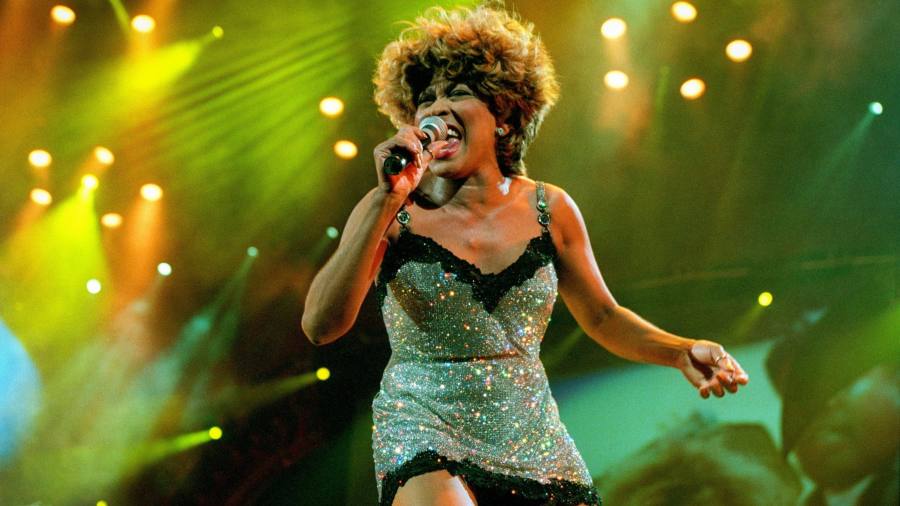When Tina Turner sang a song, it stayed sung. The Tennessee-born singer, who has died aged 83, brought the tradition of blues and gospel shouters into the loudly amplified world of rock ’n’ soul in the 1960s. Her vocal style pushed things to the limits, a sublime but risky place where words flirted with the chaos of pure sound. Witness the electrifying yowl with which she takes possession of the word “proud” in one of her best-known songs, “Proud Mary”.
Few have matched her estimated record sales of 100mn, or her assertiveness behind a microphone. But what was being asserted? Born in 1939, Turner was raised in the American South during the Jim Crow era, the daughter of black sharecroppers. However, she didn’t become a leading voice in the civil rights movement like her contemporary Aretha Franklin. Her forthrightness had a more fiercely compacted quality. It was an expression of drive, the determination to be heard whatever the obstacle.
“You take away the bondage, the problems, the hang-ups, the egos, and I can fly,” she told the LA Times in 1984. “I can laugh, I can dance, I can sing, and I don’t grow tired. Freedom. That’s my motivation.”
For the white rock musicians who copied her, freedom was a rhetorical concept. For Turner, it had an urgent practical meaning. Not only did she grow up in a southern state at a time of legalised racism, but she also entered a branch of the music business in which young female singers were choreographed and controlled by men.
Brought up as Anna Mae Bullock, she was given the stage name Tina by the R&B bandleader Ike Turner, who recruited her after hearing her sing in a St Louis nightclub in 1957. By the time they married in 1962, she had moved from back-up to lead vocalist. Ike styled her as an eroticised primitive, choosing “Tina” to rhyme with comic book heroine Sheena, Queen of the Jungle. “Ike would always have me screaming and shouting on his songs — selling them,” she said in her memoir, I, Tina.
Phil Spector was the first producer to note the quality of her singing. “He told me I had an extremely unusual voice, that he had never heard a woman’s voice like mine,” she recalled. He paid $20,000 to sign the Turners to his label. Under his aegis, they made “River Deep — Mountain High” in 1966. It featured a storming vocal from Turner, contending operatically with Spector’s imposing instrumentation. The producer rated the song among his best.
Supporting The Rolling Stones on tours in 1966 and 1969 brought the married duo a crossover audience. “Proud Mary”, originally by rock band Creedence Clearwater Revival, was their biggest hit, selling more than 1mn copies in 1971. The singer’s uninhibited stage presence was admired by rock frontmen such as Mick Jagger. Her dance moves had an unbridled energy, closer in spirit to James Brown than the drilled moves of a Motown act or girl group.

Behind the outward signs of success, Turner’s marriage was blighted by Ike’s violence towards her. When she attempted suicide with sleeping pills, she came round to find him shouting, “You should die”. In 1976, she left him, a decision which she credited to her faith in Buddhism. (Spector, who was later convicted of the murder of a woman at his home, denounced Turner at her ex-husband’s funeral in 2007.) The decision left her in debt and pursuing a flop solo career — until one of the most remarkable comebacks in pop history.
Turner’s album Private Dancer came out in 1984 when she was in her 40s. Made in the UK, a common refuge for US soul stars on their uppers, it rebooted her for an era of synthesisers and MTV. Her voice was no less resonant in this new landscape, revealing a gift for storytelling and role play. The album went multi-platinum, elevating her to the ranks of pop’s biggest names.
The singer’s run of hits continued throughout the decade, with a particular specialism in air-punching empowerment anthems such as “The Best”. In 1995, she moved to Switzerland, where she took citizenship in 2013 after marrying her second husband, Erwin Bach. She’s survived by him and two adopted sons.
Her reputation as an archetypal survivor was burnished by the Hollywood biopic What’s Love Got to Do and the jukebox musical Tina. Behind that generic tale lay individual talent, a towering voice and inimitability. “Whatever you want in life you can have it,” she said in 1979, before her grand comeback. “All you have to do is speak it, demand it; your will can make it happen. We human beings are very powerful.”
Read the full article here




